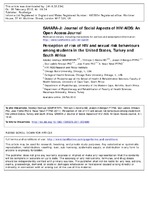Perception of risk of HIV and sexual risk behaviours among students in the United States, Turkey and South Africa

View/
Date
2011Author
Adefuye, Adedeji
Abiona, C. Tititlayo
Balogun, Joseph A.
Amosun, Seyi Ladele
Frantz, Jose M.
Yakut, Yavuz
Metadata
Show full item recordAbstract
The aim of this study was to examine HIV sexual risk behaviours and perception of HIV risk among 1 095 students from the United States of America (US), Turkey and South Africa. Randomly selected students who were enrolled in general education courses completed a structured questionnaire. Results revealed statistically significant differences in specific HIV-related sexual behaviours among students from the three countries and among male and female students in each country. A higher percentage of US and South African students engage in HIV risky sexual behaviours compared with their Turkish counterparts, and a higher percentage of female students in the US and South Africa engage in HIV sexual risk behaviours compared with their male colleagues. A higher proportion of Turkish male students engaged in sexual risk behaviours compared with their female counterparts. The perception of HIV risk was low among US and Turkish students, and high among South African students. There was no agreement between engaging in risky sexual behaviour and self-perception of HIV risk among South African female students, while agreement was poor for US male and female students, Turkish male and female students, and South African male students. The observed optimistic bias needs to be considered in the design and implementation of HIV prevention programmes for these populations.
